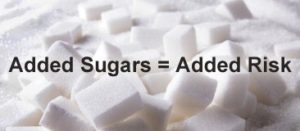
If blood sugar (glucose) and insulin levels spike, it means that they move outside of a healthy range. Doing this on a regular basis is not something you want to do, if you want to avoid permanent damage to parts of your body such as your eyes, nerves, kidneys and blood vessels. But surely taking non-nutritive sweeteners (NNS) 1 as alternatives to normal table sugar (sucrose – C12H22O11) can’t result in an unhealthy glycaemic response 2 …
Blog Contents
No sweetener is completely innocent
Well, some interesting studies suggest that there are no sugar-alternatives that are as innocent as their manufacturers make them out to be.
Study #1
A September 2017 study 3 looked at blood sugar/insulin levels over a a 24-hour period in a group of healthy males. They compared sucrose with an artificial non-nutritive sweetener (aspartame), and two plant-based sweeteners (stevia and monk fruit sweetener).
Study method
Subjects drank a sweetened drink and their blood sugar levels were measured over the next 24 hours. The aim was to monitor any spikes in blood glucose and to record the average levels of blood sugar.
Study results
There was no surprise that the drink with 16 spoonfuls of sucrose caused a 40 point jump in blood sugar within the next hour, whereas the aspartame, stevia and monk fruit caused no reaction at all. This is why people advocate that it’s better for you to use the latter sugar alternatives.
However, what was a surprise was when the average blood sugar levels were taken over the 24-hour period. There was no significant difference at all between the overall effect of increasing blood sugar levels between all the sweeteners, as can be seen from the following results.

The researchers concluded that: “Overall no significant differences were found in mean 24-h glucose, iAUC and total AUC for glucose, and 24-h glycaemic variability between the four test beverages. Twenty-four-hour glucose profiles did not differ between beverages sweetened with non-nutritive (artificial vs natural) and nutritive sweeteners. The simple exchange of a single serving of sucrose-sweetened beverage with NNS over a day appears to have minimal effect on 24-h glucose profiles in healthy males.”
This is quite a surprise when you consider that the sucrose drinks had an equivalent of 16 teaspoon of sugar in them and it’s well known that when you consume a large quantity of table sugar (such as a large glass of Coke) it will cause a big sugar spike within an hour of consumption.
To get a better idea of why this happens, we need to look at another study.
Study #2
This March 2017 study 4 used similar methods to the above study and, indeed, demonstrated that table sugar causes a significant sugar spike within 1 hour of consumption, whilst the non-nutritive alternatives (aspartame, stevia and monk fruit) had no effect. This can be seen in the following chart.
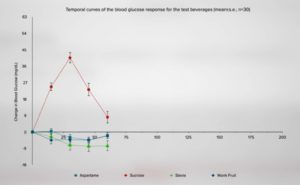
So, how could the average blood sugar levels be the same over a 24-hour period – irrespective of whether you used table sugar or one of the alternative sweeteners? One answer could be that taking non-nutritive sweeteners actually makes your blood sugar spikes worse later in the day.
And, lo and behold, this was shown to be the case, as can be seen in the following chart.
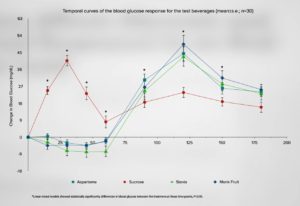
What you’re looking at is the artificial (aspartame) and natural (stevia and monk fruit) sweeteners causing an even higher blood sugar spike once the participants ate lunch an hour or so later. This is partly because they ate more at lunch when compared with the other participants who had already consumed 16 teaspoons of sugar – each teaspoon of sugar contains around 16 kcal, so that’s around 256 more calories already consumed by the sucrose group compared with the non-sugar groups.
But is this the only reason? An earlier study reveals another rather confusing twist in this sugary tale.
Study #3
This earlier 2013 study 5 looked at the effect of non-nutritive sweeteners when added to a sugary drink. The subjects were a group of obese individuals.
Study method
Splenda (a brand name of the an artificial sweetener and sugar substitute sucralose) mixed with sugar water was given to subjects and the sugar spikes were recorded. The results showed that there is a greater sugar and insulin spike within the first 60 minutes when this non-nutritive sweetener is added to the sugar drink than when the sugar drink is consumed on its own – as can be seen in the following charts.
Artificial sweetener increases glucose spike
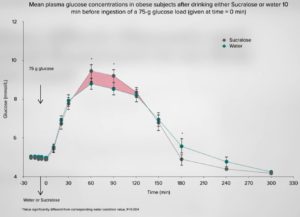
Artificial sweetener increases insulin spike
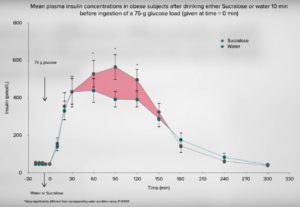
The above happens even though Splenda and presumably other artificial and natural non-nutritive sweeteners cause no initial spike when consumed on their own without being sugar. Interesting, eh?
Joe’s comments
There’s scope for further research here, of course: for instance, into the effects of all the variations of non-nutritive sweeteners that are available in the shops, to see if they do indeed have the same affect as Splenda when they are consumed along with table sugar.
But, whatever the mechanisms involved here (and I’m not convinced that they are fully understood yet), it reinforces the opinion that any added sweetener, whether sucrose, artificial or natural sweetener, is likely to cause both an insulin and a sugar spike. Of course, the occasional spike will not cause any major problems, but those people who have sweeteners in their beverages or who regularly consume foods that contain sweeteners clearly appear to be doing their bodies just as much harm as those who consume sugar – in fact, these alternative sweeteners may be having an even more damaging effect. A 2008 study 6 concluded that artificial sweeteners may fail to satisfy the brain’s desire for “natural caloric sweet ingestion” and thus cause a chain of biochemical responses that cause harm to the body. The brain is expecting calories from the sweet thing eaten, but they don’t come from the non-nutritive sweeteners.
If you are interested in looking further into the possible reasons why artificial sweeteners are considered by some experts to be even more dangerous than indicated above, there are plenty of studies 7 8 9 10 11 12 13 14 15 16 17 available for you to review – considering possible harmful effects ranging from kidney disease, neurological disorders and diabetes to prenatal tumours and other cancers. One such study, for instance, concludes that: “Overall, results of this study suggests that exposure to high glucose and artificial sweetener administration lead to unique mechanisms of vascular impairment and homeostatic alterations that may be important during the onset and progression of diabetes and obesity.” 18
Another study looked at how artificial sweeteners negatively affect the vitally important gut microbiota, concluding that: “Collectively, our results link NAS [Non-caloric Artificial Sweetener] consumption, dysbiosis and metabolic abnormalities, thereby calling for a reassessment of massive NAS usage.” 19
As with all things covered in these blogs, I suggest that sticking to a WFPB diet with no added sugar, oils or salt is the safest option if you want to consume the optimum diet for human health. Anything that has to be processed before consumption, such as all the above sweeteners (including table sugar) are ‘alien’ to the human body 20 and cannot be digested and absorbed in the same healthy way as the natural sugars contained within the natural whole plant.
This also applies to the other forms of sweetener, such as honey (non-vegan), maple syrup, agave syrup etc – they are all separated food elements that the likes of Dr Joel Fuhrman has named Frankenfoods 21 for good reason. Sugar is addictive and it can be argued pretty convincingly that the only sugars we are wise to consume are those in whole foods, where they are bound to the natural fibres with which they grew.
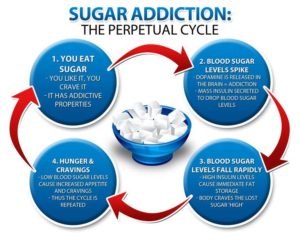
References
- Non-nutritive sweeteners are those that have zero or negligible calorie content such as aspartame (NutraSweet and Equal brand names), saccharin (Sweet’N Low, Necta Sweet, Sweet Twin, and Sugar Twin brand names), sucralose ( Splenda and Nevella brand names), stevia, acesulfame-potassium (Ace-K), neotame, monk fruit sweetener etc. [↩]
- Glycaemic response: Definition in Wikipedia [↩]
- Tey SL, Salleh NB, Henry CJ, Forde CG. Effects of non-nutritive (artificial vs natural) sweeteners on 24-h glucose profiles. Eur J Clin Nutr. 2017;71(9):1129-1132. [↩]
- Tey SL, Salleh NB, Henry J, Forde CG. Effects of aspartame-, monk fruit-, stevia- and sucrose-sweetened beverages on postprandial glucose, insulin and energy intake. Int J Obes (Lond). 2017;41(3):450-457. [↩]
- Pepino MY, Tiemann CD, Patterson BW, Wice BM, Klein S. Sucralose affects glycemic and hormonal responses to an oral glucose load. Diabetes Care. 2013;36(9):2530-5. [↩]
- Neuroimage. 2008 Feb 15;39(4):1559-69. Epub 2007 Nov 19. Sucrose activates human taste pathways differently from artificial sweetener. Frank GK, Oberndorfer TA, Simmons AN, Paulus MP, Fudge JL, Yang TT, Kaye WH. [↩]
- Environ Health Perspect. 2006 Sep; 114(9): Testing Needed for Acesulfame Potassium, an Artificial Sweetener. Myra L. Karstadt. [↩]
- Chem Senses. 2011 Nov;36(9):763-70. doi: 10.1093/chemse/bjr050. Epub 2011 Jun 7. Effects of mother’s dietary exposure to acesulfame-K in Pregnancy or lactation on the adult offspring’s sweet preference. Zhang GH, Chen ML, Liu SS, Zhan YH, Quan Y, Qin YM, Deng SP. [↩]
- Natl Toxicol Program Genet Modif Model Rep. 2005 Oct;(2):1-113. NTP toxicology studies of acesulfame potassium (CAS No. 55589-62-3) in genetically modified (FVB Tg.AC Hemizygous) mice and carcinogenicity studies of acesulfame potassium in genetically modified [B6.129-Trp53(tm1Brd) (N5) Haploinsufficient] mice (feed studies)mice. [↩]
- Adv Chronic Kidney Dis. 2013 Mar;20(2):157-64. doi: 10.1053/j.ackd.2012.12.005. Dietary sugar and artificial sweetener intake and chronic kidney disease: a review. Karalius VP, Shoham DA. [↩]
- Am J Clin Nutr. 2013 Mar;97(3):517-23. doi: 10.3945/ajcn.112.050997. Epub 2013 Jan 30. Consumption of artificially and sugar-sweetened beverages and incident type 2 diabetes in the Etude Epidemiologique aupres des femmes de la Mutuelle Generale de l’Education Nationale-European Prospective Investigation into Cancer and Nutrition cohort. Fagherazzi G, Vilier A, Saes Sartorelli D, Lajous M, Balkau B, Clavel-Chapelon F. [↩]
- Physiol Behav. 2015 Dec 1;152(Pt B):450-5. Metabolic effects of non-nutritive sweeteners. Pepino MY. [↩]
- Environ Health Perspect. 1987 Nov;75:53-7. Possible neurologic effects of aspartame, a widely used food additive. Maher TJ, Wurtman RJ. [↩]
- Environ Health Perspect. 2007 Sep; 115(9): A460.
PMCID: PMC1964912. Aspartame Cancer Risks Revisited: Prenatal Exposure May Be Greatest Concern. M. Nathaniel Mead. [↩] - Am J Clin Nutr. 2012 Sep; Association between intake of artificially sweetened and sugar-sweetened beverages and preterm delivery: a large prospective cohort study1. Linda Englund-Ögge, Anne Lise Brantsæter, Margareta Haugen, Verena Sengpiel, Ali Khatibi, Ronny Myhre, Solveig Myking, Helle Margrete Meltzer, Marian Kacerovsky, Roy M Nilsen, and Bo Jacobsson. [↩]
- Trends Endocrinol Metab. 2013 Sep;24(9):431-41. doi: 10.1016/j.tem.2013.05.005. Epub 2013 Jul 10. Artificial sweeteners produce the counterintuitive effect of inducing metabolic derangements. Swithers SE. [↩]
- Afr Health Sci. 2013 Sep; 13(3): 541–545. A comparative study of the effect of diet and soda carbonated drinks on the histology of the cerebellum of adult female albino Wistar rats. MA Eluwa, II Inyangmme, AO Akpantah, TB Ekanem, MB Ekong, OR Asuquo, and AA Nwakanma. [↩]
- The Influence of Sugar and Artificial Sweeteners on Vascular Health during the Onset and Progression of Diabetes. Brian Hoffmann (Medical College of Wisconsin, Medical College of Wisconsin, Medical College of Wisconsin, Marquette University), George Ronan (Medical College of Wisconsin, Marquette University), Dhanush Haspula (Medical College of Wisconsin). EB 2018. Board # / Pub #: A322 603.20. [↩]
- Nature. 17 September 2014. Artificial sweeteners induce glucose intolerance by altering the gut microbiota. Jotham Suez, Tal Korem, David Zeevi, Gili Zilberman-Schapira, Christoph A. Thaiss, Ori Maza, David Israeli, Niv Zmora, Shlomit Gilad, Adina Weinberger, Yael Kuperman, Alon Harmelin, Ilana Kolodkin-Gal, Hagit Shapiro, Zamir Halpern, Eran Segal & Eran Elinav. [↩]
- Harvard Health Blog. Artificial sweeteners: sugar-free, but at what cost? JANUARY 08, 2018. Holly Strawbridge. Former Editor, Harvard Health. [↩]
- Dr Fuhrman – Frankenfoods [↩]